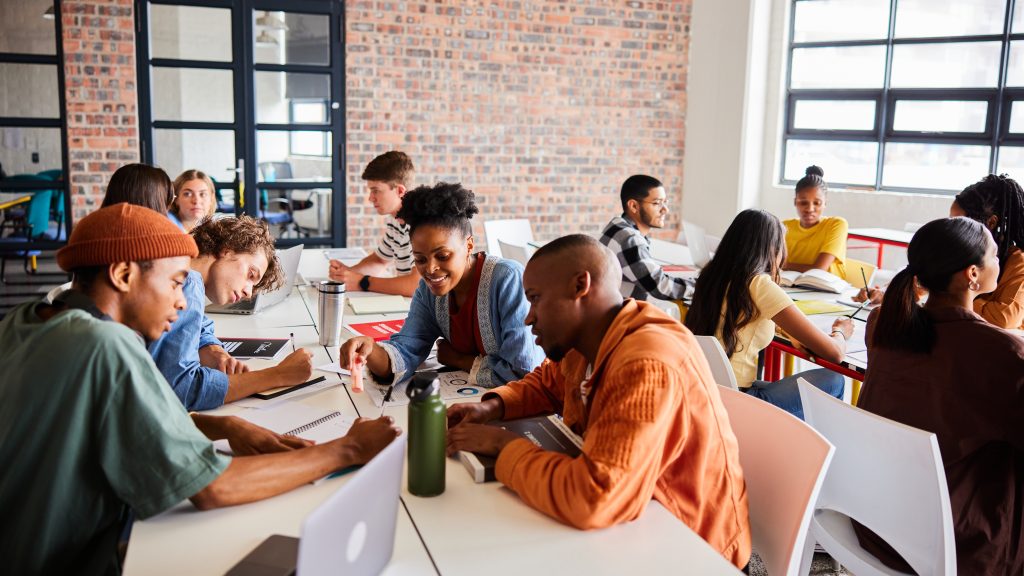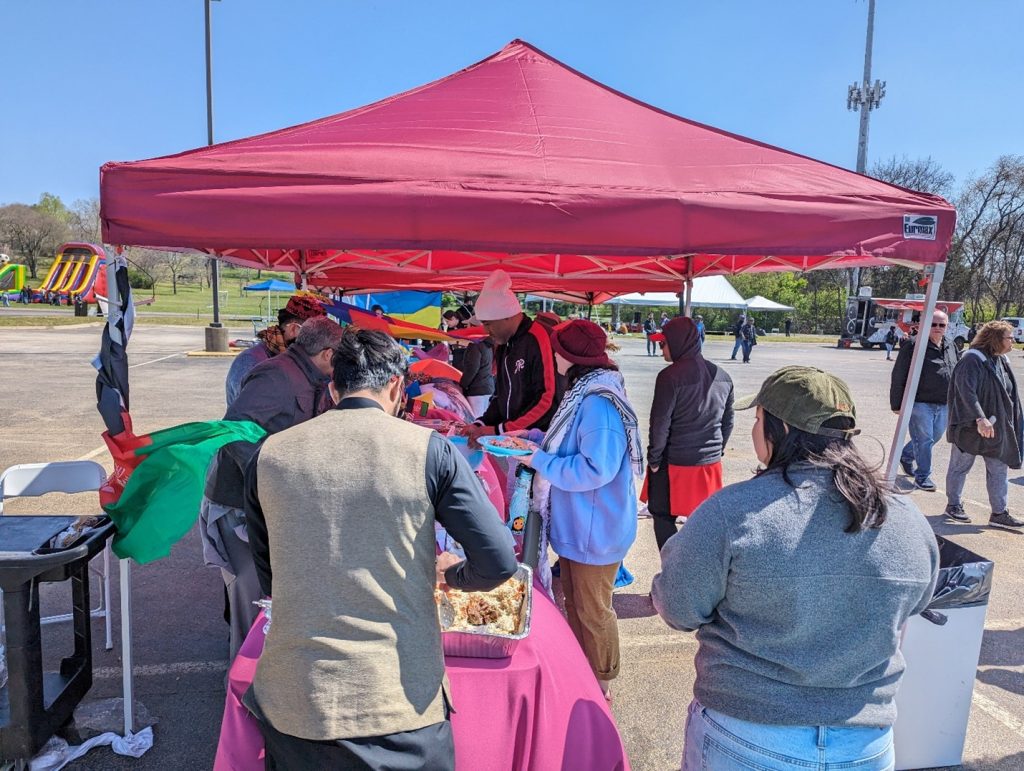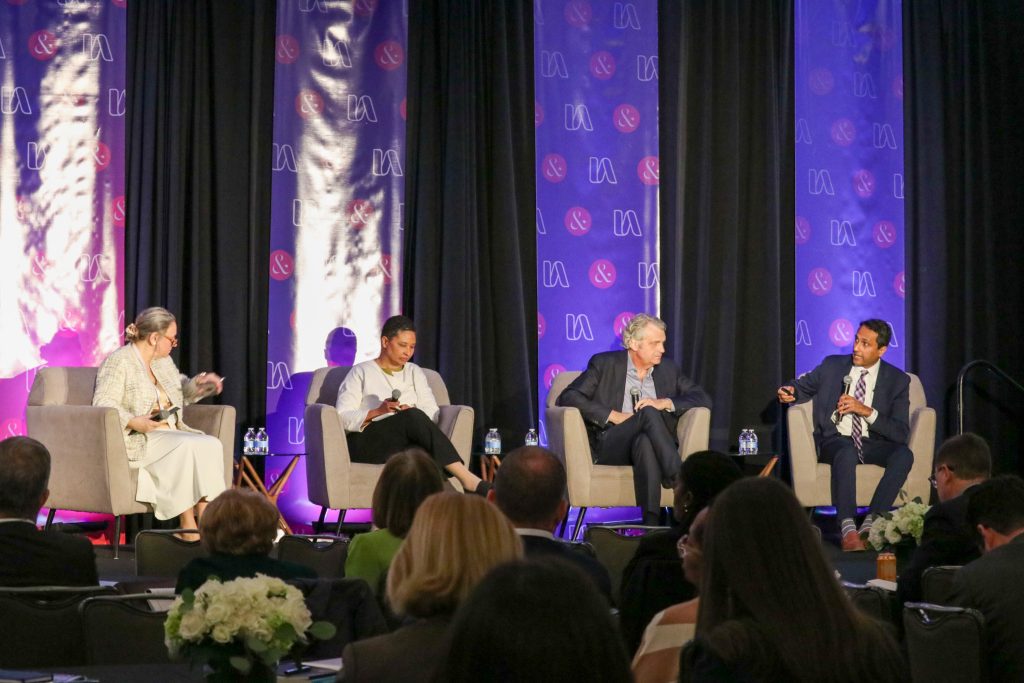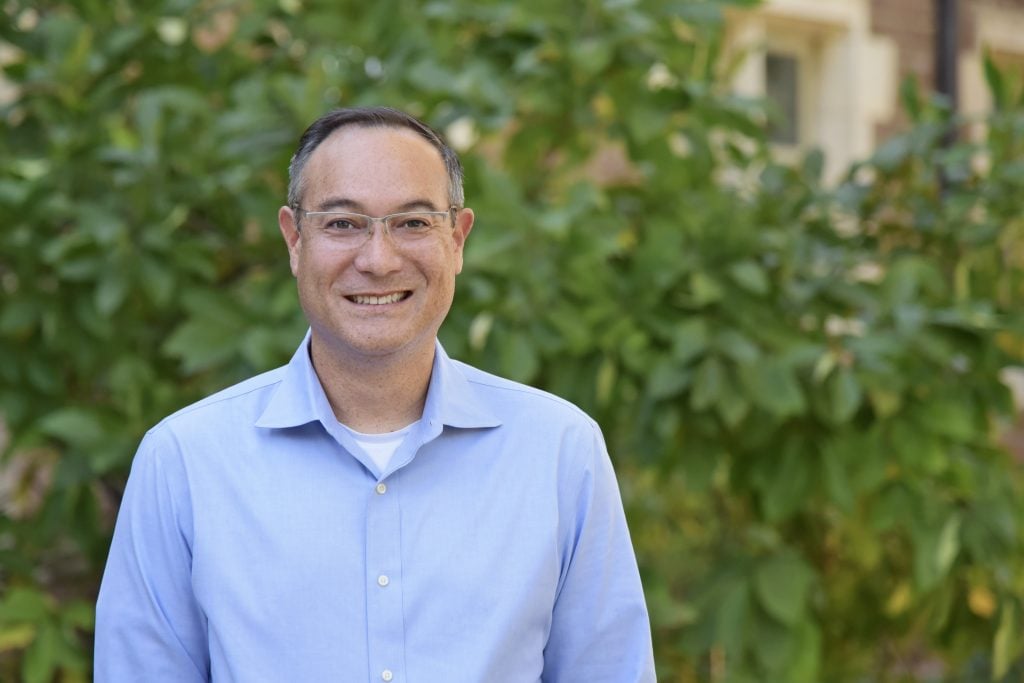Faith, Hope, and Eloteros: How One Chicago Nonprofit Is Responding to the Pandemic
June 28, 2021
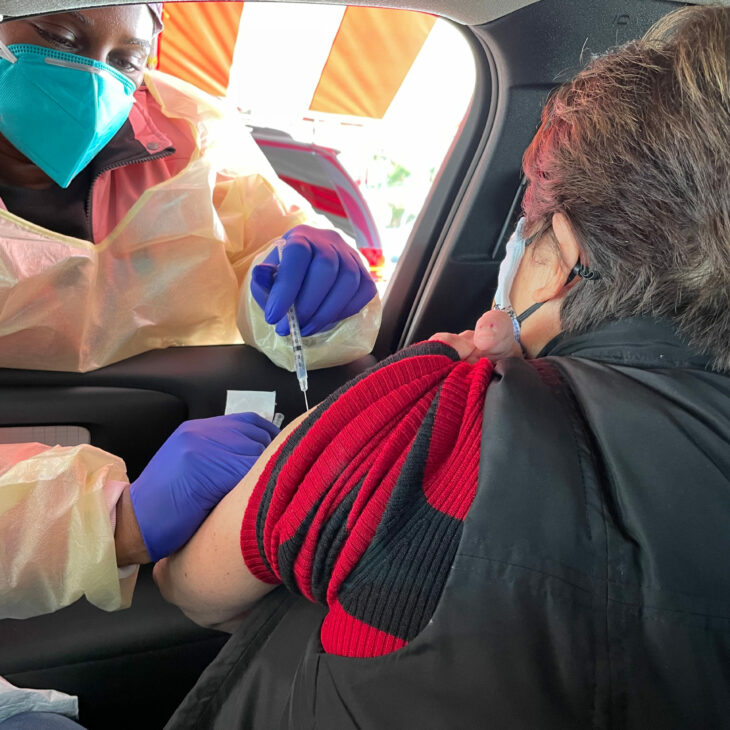
This article is part of a series called Faith in the Field that explores responses to Covid-19—including vaccination efforts—within different faith communities. The series features racially and religiously diverse leaders across the United States who shared their stories with IA via one-on-one interviews. In addition to illuminating distinctive experiences of the pandemic through a faith lens, these interviews offer practical guidance for conducting vaccine outreach in thoughtful, culturally competent ways.

The following interview features Berto Aguayo, executive director and co-founder of Increase the Peace, a Chicago-based organization that tackles the root causes of violence through leadership development and community organizing. The interview was conducted by Janett I. Cordovés for IA; it has been edited and condensed for clarity.
Interfaith America (IA): Thanks so much for having this conversation with me today. For all those following along, can you tell us about yourself and your organization?
Berto Aguayo (BA): I’m the executive director and co-founder of Increase the Peace, an organization that focuses on violence prevention through leadership development, policy advocacy, and organizing on the ground. And my faith background—I am Catholic. I was “made in Mexico” but I was raised in Chicago. There were a lot of Catholic churches, so that was where we spent a lot of our time. Even the open gym available to us in the neighborhood growing up was at a church. And I think a lot of the Catholic social teaching doctrine prepared us for … helping others, being a part of your community. Giving the little you had to help other folks was always something that was ingrained in us and even more so when I went to college at Dominican University, a Catholic institution.
IA: I was also raised Catholic, and the tenets of service to others and giving to the least of these have always stuck with me. On that note, can you tell me about how the Covid-19 pandemic has affected your community and how you have responded?
BA: During the start of the pandemic, I think it’s safe to say that communities like Back of the Yards [in Southside Chicago], especially Latino communities that we operate in, that I live in and was born and raised in, were in a little bit of a state of emergency. I was getting calls from community members about help for funeral expenses. And I remember calling funeral places and they were telling me they were over capacity; even though they wanted to help, they didn’t have the bandwidth to help. And then you added this [violence] on, what’s been known as the riots of 2020. People were fighting in the middle of the street; there were cars pulling up, people breaking into different buildings, Black and Brown folks fighting against one another. It was just chaos.
After that, we really focused our efforts on building unity among Black and Brown communities, saying, “Hey, we’re stronger together.” We decided to have a food pantry because all the stores were closed. There was no way to get food and people couldn’t afford food. It was a multicultural unity food pantry—people of different faiths, races, backgrounds, coming together to serve food. So, we pulled up in the parking lot of the Walgreens … with some food. I remember the local priests came over, gave us some bags to put people’s food in. Our thought was, “We’re going to be here from 11 to 1.” But the line was blocks long. There was such need, and we didn’t end until 7 p.m. We continuously ran out of food, and we were continuously getting more food to make sure everybody had something.
It was a pandemic on a pandemic [that summer]. The violence was a pandemic that tore our communities apart. There were a lot of institutions that we expected to help [us] in that time of need that just were not present. We were one of the only organizations trying to keep some sort of peace, some sort of semblance of unity. One of the things that became true for us is that corny saying, “We’re the ones you’ve been waiting for.” That was literally true [in these communities] at that moment. There was no one else, no one else was going to come and save us. And we had to save ourselves. Now the focus has shifted to the same kind of need with vaccines.
IA: Thank you so much for sharing that. Wow. I’m interested in hearing how you personally navigated this time of uncertainty and isolation. Have you leaned into faith during this time?
BA: For me, there were moments when I was in the middle of turmoil, when our organization was in the middle of the riots and people needing food … and faith was the only thing we could turn to, you know, to give us hope. At Dominican University, I used to study in this library that’s right next to a chapel. And every now and again, I would go pray, I would go center myself. I would go there over the [past] summer, travel 45 minutes to that place that I felt was grounding to me, because I just needed to be closer to God to get some guidance.
And then I think another way that I leaned into faith was, before the pandemic, I had asked the sister of a local church to be my mentor, Sister Angie. She is a beloved figure in the community, so much so that she has a sandwich named after her in the local coffee shop. And, you know, Sister Angie and me, we go back, right? And man, in some of these intense times of conflict and tension, I would just call her, and she provided so much wisdom, and she still does. So much wisdom and guidance. And I was able to put that wisdom and guidance that she’s learned through 40 years of working with youth in the neighborhood into practice in the community. Even though she’s no longer a sister and is not able to be out on the streets as much as I can, it was still her work, her legacy, her faith background helping me navigate the on-the-ground work.
IA: And what about trusted faith leaders or messengers within the community. How have they shown up during the pandemic?
BA: In the community, I saw a real need for churches and local faith institutions to be more accessible. Because the reality was that a lot of the faith institutions were some of those institutions that we were like, “Hey, where you all at?” I have a lot of relationships with local faith leaders [but] I remember to this day that I would call their offices almost every other week about holding a pantry or something. And they were really inaccessible. Now there’s one specific church in the neighborhood where priests have a great relationship [with my organization], and the relationship was already there. That church was always accessible to us.
I think it’s important to hold our faith institutions accountable because they are part of the community, and when the community is in need, those big spaces deserve to be accessible to people. The one church that we had a preexisting relationship with, I think that certainly helped. But I also think it’s incumbent upon all faith leaders and communities to build relationships with members of the community.
IA: I ‘d like to talk about vaccine efforts in your community, as well. What challenges have been brought to bear in getting people vaccinated? What approaches have been successful?
BA: We didn’t have a vaccination site in the neighborhood. So, we began to work with coalition partners, and we started having conversations with the city demanding that we get a vaccination site. We finally got the vaccination site in the neighborhood and we’re like, “Yes, big win.” And we know that, in our community, the younger folks can help older residents navigate the vaccination registration process. So, we thought, “Hey, why don’t we hit two birds with one stone? Why don’t we hire young people that are disconnected, which means they’re unemployed, and out of school, and we train them to help other older residents?” These are people who can navigate [the system], get people registered for the vaccine, and meet people where they’re at. So, we hired some young people, we brought them on board, and we set up shop at taquerias and laundromats everywhere. And the first 1,000 slots for the vaccine were gone within about 24 hours.
And then we coupled that with our work with street vendors. We [Increase the Peace] provide a lot of street vendors aid and help. We provided dozens with $500 in cash assistance throughout the course of the pandemic. So, we got some of them to get vaccinated. They would take a picture and post it on their own social media, saying, “Hey, I got vaccinated. Come over. Get vaccinated.” We’re going to continue doing that to really amplify those voices because, for our communities, those are the trusted messengers. It’s young people, it’s the street vendors, it’s the elotero (street corn vendor) that everybody knows, and they love their elotes (street corn). One of our folks, sort of a local, sells churros outside our churches when they let out. Everybody knows him, right? So, he gets vaccinated and he’s not only on social media but he’s on the ground, and we give him his talking points: Agarraraste la vacuna? (Did you get the vaccine?) Si, ya la agarre en la 46 y Bishop. (Yes, I got it at 46th and Bishop.) Boom, he’s spreading the word. Yeah, the trusted word passes on quickly. A lot of folks, especially city partners, were just amazed as to how fast we were able to get people registered for the vaccine, simply because we trusted people on the ground gave them the tools.
IA: After six, or nine, or 12 months, depending on when you officially went into lockdown … To get some churros? That would bring me out of the house and back to church. So, Berto, I just want to ask you one last question. Some of the things we’ve been chatting about today have to do with inequity—inaccessibility, lacking resources. It’s causing me to think about public health and equity in public health. Do you think faith communities have a role to play in advancing equitable public health? If yes, how do you imagine that role for your own faith community?
BA: Yes, definitely. Like I mentioned, there’s priests and nuns and different people that are part of our coalition in the neighborhood. It’s nice to see that involvement because it allows the church to come out onto the streets and meet people’s needs on the ground. And one of the ways to be on the ground, micro local, is to be engaged and to be present, and to show up. If a relationship is not reciprocal, then it’s not a good relationship. And so, faith leaders, as much as they want people to come into their spaces of faith, they need to come out into spaces of the community. That reciprocity can go a long way in being able to push for equitable public health practices. Whether that’s a local vaccination site and being involved with that or pushing the city or state governments to have more Covid-19 vaccination sites and testing sites, more health centers or mental health clinics, or [addressing] any other issue that impacts public health.
If you try to push for public health or public health change for the community but you only do it inside your own space of faith, it’s not going to yield all the voices that are necessary to be at the table to push for some of these things. And I’ll even add, [this approach] is mutually beneficial. It’s in the interest of a faith space to build those relationships in the community. Because I’ll tell you, I’m way more inclined to let somebody know about Pastor Donna’s church or to be in that space and utilize that space and be in community with her because I have that relationship. And I think that’s ultimately the name of the game.
IA: I want to thank you so much for your time and having this conversation with me about what is going on in Back of the Yards with Covid-19. Are there any words of wisdom or last thoughts you’d like to share?
BA: The more we can build relationships with one another, the more we can deepen and strengthen our faith and increase our empathy and care for one another, the better. The digital world has made us closer and yet a little disjointed. Having those face-to-face conversations is crucial. While we love technology, and it crosses different seas and continents, there’s something to say for in-person interactions and being in the community and working with your hands and doing something together.
If you would like to know more about IA’s work on Faith in the Vaccine, please click here to see how you can help.
Share
Related Articles
American Civic Life
Faith Based Efforts Work in Vaccine Uptake: Now Let’s Make it Easy
American Civic Life
American Civic Life
